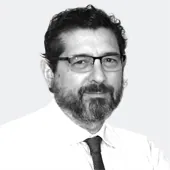Major reshuffle in Andalucía's regional government team with more women at the top
President Juanma Moreno has appointed Carolina España, the politician from Malaga, as the Junta's official spokesperson
He had announced it as a simple readjustment of who would be in charge of what in Andalucía's regional government. However, Junta President Juanma Moreno has mounted a full-blown government crisis with a ministry reshuffle in which he has changed the heads of the two main ministries: Health and Education. To ensure that there is no doubt that a new phase has begun, he has also decided to change the spokesperson for the Junta, who from now on will be Carolina España, a function that she will combine with her retained position as Minister of Economy, Finance and European Funds, thus boosting her political profile. "Governments are constantly evolving and adapting", Moreno argued on Monday from the regional government's headquarters at the Palacio de San Telmo.
Juanma Moreno had been reflecting on this critical matter since 2 May, when his decision became known that he was going to send his then Minister of Agriculture, Water and Rural Development, Carmen Crespo, to the European Parliament, having already made her his number two on the Partido Popular's list. These major changes, communicated this Monday by means of a press release from the Palacio de San Telmo without appearing before journalists, involve the entry into the government of two new female ministers - both independents - to head the two key departments of Health and Education. This move does not involve the departure of the former heads of Health and Education, as they will move on to other departments.
For Health, the department that had become the Junta's Achilles' heel and the target of most criticism towards the regional government, Moreno has selected the paediatrician Rocío Hernández Soto, until now managing director of the Aljarafe-Sevilla Norte Primary Care Health District and president of the Spanish Society of Primary Care Managers. In his speech Moreno pointed out that his government is working in an acceptable manner "trying to ensure that the successes are many more than the errors, successes of which there are and will be more." Health, and specifically primary care, had become one of his main policy headaches, so the appointment of Hernández Soto sends a strong political message.
A health specialist for the most pressing problem
The Andalusian government is aware that they have a problem in healthcare and very specifically in primary care. That is why they have sought out a specialist, the paediatrician Rocío Hernández Soto, who since March 2019 has been managing director of the Aljarafe-Sevilla Norte Primary Care Health District and since June 2022 has been president of the Spanish Society of Primary Care Managers (Sedap). Among her challenges Hernández will have to redirect healthcare management and rebuild relations between the regional government and the medical profession, both of which have deteriorated in recent years. For the moment, the new minister's appointment has been well received. The main trade unions for health workers - CCOO, UGT, the Nursing Union, Satse, the Andalusian Medical Union (SMA) and CSIF - have all welcomed her appointment. The Andalusian Medical Union has highlighted the "colossal challenge" for Rocío Hernández Soto in her new role in view of the "unprecedented dimension" of the "problems" of public healthcare provision in Andalucía.
Catalina García, who until now has been Regional Minister for Health, is not leaving the government, as she is moving to the portfolio of Sustainability and the Environment. Ramón Fernández-Pacheco, who is also leaving his post as spokesperson for the Junta, will move to the Ministry of Agriculture, Water and Rural Development. The countryside and the fight against drought are two of the issues that the Junta considers strategic in this term of office.
All change in Education
The other addition is the new Regional Minister for Educational Development and Vocational Training, María del Carmen Castillo Mena, from Almería, who replaces Patricia del Pozo. Castillo (Almería, b. 1967), who holds a degree in Law from the University of Granada, was deputy minister of Education and Sport during the previous government when the portfolio was held by Javier Imbroda.
The former head of this ministry, Patricia del Pozo, has been transferred to the only newly-created ministry, Culture and Sport, whose responsibilities have been separated from the Ministry of Tourism, to which the portfolio for External Action, which until now formed part of the Ministry of the Presidency, has been incorporated. As a result, the ministry headed by Arturo Bernal is now called Tourism and Global Andalucía. The continuity of Bernal's responsibilities for Culture, which has been contested especially from some quarters in the province of Seville, was one of the unknowns that remained open after the announcement of the changes. With the new configuration of the regional government, Bernal will concentrate on the areas in which he is most proficient, strengthened by the External Action portfolio.
Independent and experienced in management
The new Regional Minister for Educational Development and Vocational Training, Carmen Castillao, is an old acquaintance in the Regional Ministry of Education. A career civil servant in the Junta de Andalucía's Inspectorate of Education since 2008 and in the Corps of Secondary Education Teachers specialising in Business Administration since 1997, she was deputy minister during the previous legislature under Javier Imbroda, who had first appointed her as territorial delegate for Almería. She was in charge of this portfolio, from where she had to deal with the management of the gigantic Andalusian educational structure during the Covid crisis. This experience has been valued by the trade unions. UGT Andalucía, CSIF and Ustea Enseñanza have asked her for talks to work in favour of Andalucía's public education system. UGT Andalucía welcomed the appointment and highlighted the "good relationship" maintained throughout the Covid-19 pandemic and during her time as deputy minister.
A woman's voice in Funding
The appointment of Carolina España as spokesperson is due to two key issues. The first, and most relevant, is the importance that the issue of regional funding has had throughout the legislature and which will increase in the coming months, especially if Spain's President Pedro Sánchez reaches an agreement with Catalan nationalists that includes a privileged system of funding for Catalonia. With Carolina España as the face of the Junta, it is hoped that the Andalusian government's position on this strategic issue will be able to achieve greater prominence. Moreover, this politician from Malaga is considered to have the right profile to confront the First Vice-President of the Spanish government and Minister of Finance, María Jesús Montero, who, as an Andalusian too, is also seen as a possible replacement for the leadership of the PSOE party in Andalucía.
Furthermore, Junta President Moreno has been surrounded only by men up to now. To be precise, the roles of minister of the Presidency, Junta spokesperson, parliamentary spokesperson and secretary general of the Andalusian PP have all been filled by men. Moreno was interested in increasing the visibility of women in his team as part of this reshuffle. In fact, in his speech to announce the new composition of the Executive (similar to a regional Cabinet), he made a point of highlighting the fact that with the changes there will now be eight female and only six male colleagues in that select group.
Until now, Juanma Moreno has been surrounded exclusively by men
There will be no changes in the composition of the rest of the executive team, so that in addition to eight male and six female ministers with portfolios, there will be four independent members. The two new members joining the regional government are the head of University, Research and Innovation, José Carlos Gómez Villamandos, and the head of Industrial Policy, Energy and Mines, Jorge Paradela.
The rest of the Junta's areas of responsibility remain as they are, with Rocío Díaz at the head of Development, Territorial Planning and Housing, Rocío Blanco for Employment, José Antonio Nieto for Justice, Loles López for Inclusion and Antonio Sanz as Regional Minister of the Presidency, who is also in charge of the coordination of the Junta.
Juanma Moreno summoned all of them to the Palacio de San Telmo on Monday to inform them one by one of the content of the changes before making them public.

